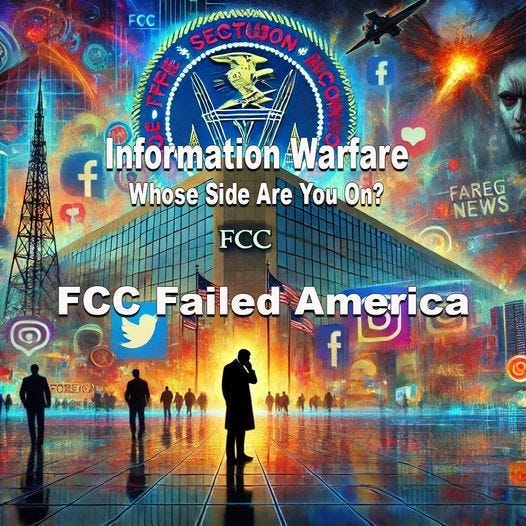The Failure of the FCC
The Role of the FCC to Protect America Against Information Warfare
The Federal Communications Commission (FCC) is a crucial regulatory body in the United States, tasked with overseeing interstate and international communications by radio, television, wire, satellite, and cable. Its mission is to promote connectivity and ensure a robust and competitive market. However, in the era of information warfare, the FCC’s role in safeguarding the public from misinformation and disinformation has come under scrutiny. One significant area of concern is the proliferation of opinion-based news networks operating under the guise of factual news without appropriate oversight or regulation.
The Function of the FCC
1. Regulatory Oversight:
Licensing and Regulation: The FCC is responsible for licensing broadcast television and radio stations, ensuring they operate in the public interest, convenience, and necessity.
Content Standards: Historically, the FCC has enforced content standards, including prohibitions on obscene, indecent, and profane broadcasts. It also ensures that broadcasters provide fair coverage of issues of public importance.
2. Public Interest:
Promoting Diversity: The FCC aims to promote diversity in media ownership and content, ensuring that a variety of viewpoints are available to the public.
Protecting Consumers: The FCC works to protect consumers from harmful practices and ensures access to emergency information and communications services.
The Rise of Opinion-Based News Networks
1. Blurred Lines Between News and Opinion:
Opinion as News: Over the past few decades, there has been a marked increase in the number of opinion-based news networks. These networks often present commentary and opinion as if it were factual news, blurring the lines between objective reporting and subjective analysis.
Lack of Fact-Checking: Unlike traditional news outlets that adhere to rigorous fact-checking standards, many opinion-based networks do not verify the accuracy of the information they broadcast, leading to the dissemination of misinformation.
2. Impact on Public Perception:
Misinformed Public: When opinion is presented as fact, it can mislead audiences, shaping public perception based on incomplete or biased information. This is particularly dangerous in a media landscape where consumers may not distinguish between factual news and opinion.
Polarization: Opinion-based networks often cater to specific ideological audiences, reinforcing existing biases and contributing to increased political and social polarization.
The FCC’s Failures
1. Inadequate Regulation:
Lack of Distinction: The FCC has not adequately distinguished between opinion-based programming and factual news in its regulations. This failure allows opinion networks to operate with the same credibility as traditional news outlets, misleading audiences about the nature of the content they consume.
Absence of Warnings: The FCC does not require opinion-based networks to display warnings advising viewers that the content is opinion-based and not subject to the same fact-checking standards as traditional news. Such warnings could help audiences critically evaluate the information presented to them.
2. Failure to Adapt:
Modern Media Landscape: The FCC’s regulatory framework has not kept pace with the rapid evolution of the media landscape. In an age where digital and cable news dominate, the lack of updated regulations has left the public vulnerable to information warfare tactics.
Protecting Public Interest: By not enforcing stricter content standards and fact-checking requirements, the FCC has failed to protect the public interest, allowing misinformation to proliferate unchecked.
The Consequences of Inaction
1. Erosion of Trust:
Distrust in Media: The spread of misinformation and the blurring of news and opinion have eroded public trust in the media. When audiences cannot differentiate between fact and opinion, their trust in all news sources diminishes.
Democratic Integrity: A well-informed public is crucial for the functioning of a healthy democracy. The FCC’s failure to regulate opinion-based networks undermines the democratic process by enabling the spread of misinformation.
2. National Security:
Information Warfare: In the context of information warfare, the unchecked spread of misinformation poses a significant threat to national security. Adversaries can exploit these vulnerabilities to sow discord, influence elections, and undermine public confidence in democratic institutions.
Moving Forward: Recommendations for the FCC
1. Stricter Regulations:
Clear Distinctions: The FCC should implement regulations that clearly distinguish between opinion-based programming and factual news. This includes requiring networks to label opinion content and display warnings to viewers.
Fact-Checking Standards: The FCC should establish and enforce fact-checking standards for all news broadcasters, ensuring that the information presented is accurate and reliable.
2. Public Education:
Media Literacy Campaigns: The FCC should support and promote media literacy campaigns that educate the public on how to identify credible news sources and discern between fact and opinion.
Encouraging Diverse Perspectives: The FCC should encourage consumers to seek out and compare opinions from various perspectives and to verify information against trusted, verified news sources.
3. Enhanced Monitoring:
Content Review: The FCC should enhance its monitoring of broadcast content to identify and address instances of misinformation and ensure compliance with new regulations.
Public Feedback: Establishing channels for public feedback and complaints can help the FCC address concerns about misinformation and bias in broadcasting.
Conclusion
The FCC plays a critical role in maintaining the integrity of American media and protecting the public from misinformation. However, its failure to regulate opinion-based news networks adequately has left Americans vulnerable to information warfare. By implementing stricter regulations, promoting media literacy, and enhancing monitoring, the FCC can better safeguard the public interest and ensure that the media landscape remains a reliable source of information.


